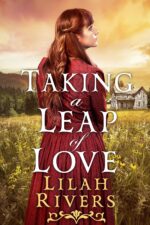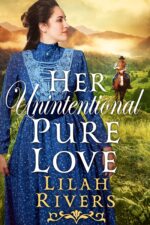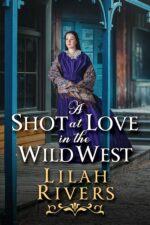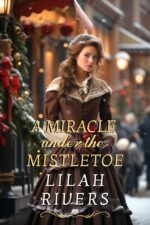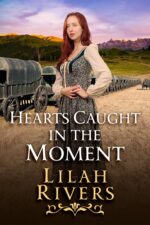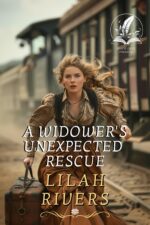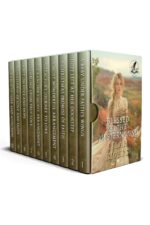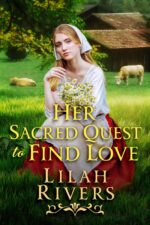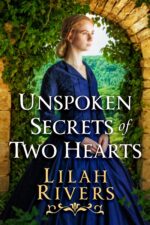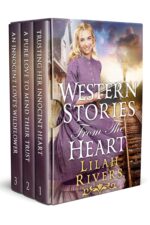-
Western Paths to Love: an Inspirational Historical Romance Collection and Love on The
Discover three heartwarming historical Western romances filled with love, courage, and inspiring journeys. Each story features strong characters overcoming challenges to find their true happiness. Perfect for romance lovers!$0.00$0.99 -
-
Where Pure Hearts Wander West: an Inspirational Romance Collection
Enjoy heartwarming tales of love, resilience, and adventure in this collection of six Inspirational Western romances, featuring strong women and charming heroes facing secrets and challenges together.$0.00$0.99 -
The Seamstress’s Christmas Prayer: an Inspirational Romance Novel
In “The Seamstress’s Christmas Prayer,” Sarah and Daniel find healing, love, and hope together during Christmas in a new town, despite personal losses and community struggles.$0.00$0.99 -
In Search of Love and Affection: an Inspirational Historical Western Romance Book and Love on The
“In Search of Love and Affection” follows Julianna, a determined sister, and Sheriff Thomas as they unravel her brother’s mysterious disappearance in a small California town, finding love along the way.$0.00$0.99 -
Taking a Leap of Love: an Inspirational Historical Western Romance Book and Love on The
In “Taking a Leap of Love,” Bella and Josh, rivals from feuding families, must navigate love amidst conflict. Will their romance triumph over deep-rooted tensions? A heartfelt western romance awaits!$0.00$0.99 -
Her Unintentional Pure Love: an Inspirational Historical Western Romance Book and Love on The
In a struggling ranch, Laila faces family troubles and a wealthy newcomer’s hidden agenda. Amidst challenges, unexpected romance blossoms, leading to tough choices about love and loyalty.$0.00$0.99 -
-
Love Stories Made in Heaven: an Inspirational Historical Romance Collection and Love on The
Enjoy a collection of three heartwarming Inspirational Historical Western romances featuring strong heroines, charming heroes, and stories of love, faith, and second chances. Perfect for fans of clean romance!$0.00$0.99 -
A Shot at Love in the Wild West: an Inspirational Romance Novel Hearts of The
In “A Shot at Love in the Wild West,” a reluctant marriage sparks unexpected passion between free-spirited Tabitha and misunderstood Josiah, challenging them to confront their pasts and uncover true love.$0.00$0.99 -
Hope Cradled in Her Arms: an Inspirational Romance Novel
In “Hope Cradled in Her Arms,” Seraphina and Dr. Sterling navigate unexpected marriage, newfound love, and danger on the Oregon Trail while protecting an orphaned baby. A heartfelt, historical romance.$0.00$0.99 -
A Miracle Under the Mistletoe: an Inspirational Romance Novel and Love on The
In “A Miracle under the Mistletoe,” Emily fights to save her family home while an enigmatic rancher secretly helps her. As their bond grows, can love survive hidden truths?$0.00$0.99 -
-
Hearts Caught in the Moment: an Inspirational Romance Book and Valor on The
In “Hearts Caught in the Moment,” determined Annabelle challenges societal norms to save her father’s business while navigating love and rivalry with her competitor, Mike, in 1864 Montana.$0.00$0.99 -
A Widower’s Unexpected Rescue: an Inspirational Romance Novel
In this heartfelt historical romance, a widowed rancher cares for an amnesiac woman, igniting an unexpected love that challenges their pasts and fears, leading to second chances and healing.$0.00$0.99 -
Blessed by the Western Wind: an Inspirational Romance Collection
Discover ten heartwarming Western romances featuring resilient women and charming men facing love, challenges, and unexpected twists. Perfect for fans of clean, inspirational love stories!$0.00$2.99 -
Their Warm Ray of Joy
In “Their Warm Ray of Joy,” journalist Iris reunites with her family’s rival, sheriff Theodore, while trying to care for his adopted daughter Birdie. Can love conquer their family’s feud?$0.00$0.99 -
Her Sacred Quest to Find Love: an Inspirational Historical Romance Book and Valor on The
In “Her Sacred Quest To Find Love,” Amanda returns home to confront her past and finds unexpected love with farmer Brian. Together, they navigate heartache and tough choices for a happier future.$0.00$0.99 -
Unspoken Secrets of Two Hearts: an Inspirational Historical Romance Book and Love on The
Join Dorothy, a deaf frontier girl in Montana, as she defies her controlling parents and discovers love with a ranch hand who understands her, in this heartfelt historical romance.$0.00$0.99 -
The Easter Miracle of Love: an Inspirational Romance Novel and Love on The
In “The Easter Miracle of Love,” Samantha must choose between her family’s expectations and her growing love for the rugged blacksmith Cole, navigating passion and obstacles during a bustling Easter season.$0.00$0.99 -
Stumbling Upon True Love: an Inspirational Romance Novel Hearts of The
In “Stumbling Upon True Love,” Lavinia escapes her troubled life, encountering rancher Victor, who faces a choice between duty and love. Discover their journey through obstacles toward a hopeful future.$0.00$0.99 -
Destined for a Life Together: an Inspirational Romance Novel Hearts of The
In “Destined for A Life Together,” Emily teams up with a troubled bounty hunter to rescue her brother from dangerous men, balancing love and revenge along the way.$0.00$0.99 -
Western Stories From the Heart: an Inspirational Historical Romance Collection and Love on The
Enjoy three heartfelt Inspirational Historical Western romances, featuring strong women, determined men, love, and emotional twists. Perfect for fans of clean, standalone stories with happy endings!$0.00$0.99





